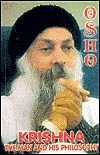What do you think?
Rate this book


696 pages, Paperback
First published January 1, 1985
There is a beautiful story about the flute of Krishna. You know Krishna always holds a flute in his hand, but there is a great story behind it. Everyday Krishna would go in the garden and say to all the plants, “I love you”. The plants were very happy and responded back and said “Krishna, we love You, too”. One day Krishna rushed quickly into the garden very alarmed. He went to the bamboo plant and the bamboo plant asked, “Krishna, what´s wrong with you?” Krishna said “I have something to ask you, but it is very difficult”. The bamboo said “Tell me: if I can, I will give it to you”. So Krishna said “I need your life. I need to cut you”. The bamboo thought for a while and then said “You don´t have any other choice. You don’t have any other way?” Krishna said, “No, no other way”. And it said “OK, I surrender to you”. So Krishna cut the bamboo, made holes in it, and each time, while he was doing that, the bamboo was crying with pain, because he was paining the bamboo so much. Krishna made a beautiful flute out of it. And this flute was with Krishna all the time. 24 hours a day, it was with Krishna. Even the Gopis were jealous of the flute. They said, “Look, Krishna is our Lord, but yet we get to spend only some time with him. He wakes up with you, He sleeps with you, all the time you are with him”. So one day they asked the bamboo, “Tell us the secret of it. What secret do you have, that the Lord treasures you so much?” And the bamboo said “The secret is that I´m empty inside. And the Lord does whatever he wants with me, whenever he wants with me and however he wants with me”. So this is complete surrender: where God can do whatever He wants with you, whenever He wants, as He wants. And for that you
don’t need to be scared, you know, you have just to give yourself. And who is yourself in reality? It’s just Him!